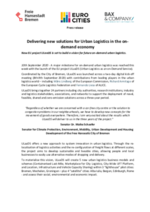Stakeholder engagement for urban logistics
ULaaDS stakeholder engagement experts Melanie Troppe and Günther Illek, from the Interdisciplinary Research Centre for Technology, Work and Culture (IFZ) recently joined another CIVITAS project, FastTrack, for their second Capacity Building Week. The ULaaDS team provided expertise in a session focused on Setting up logistics fora, sharing their experiences using a stakeholder engagement approach developed by and tested in the three ULaaDS cities of Groningen, Mechelen and Bremen. This was an ideal opportunity to share with representatives of eight other cities who joined the session, namely: Riga, Munich, Antwerp, Rotterdam, Stockholm, Brno, Gdynia, and Murcia.
One of the key messages shared was that engaging with stakeholders is an essential step for public authorities to achieve their decarbonisation goals. Measures and policies for zero-emissions city logistics can have adverse impacts on different actors, making them unpopular. As a result, early dialogues can help prevent resistance to change.
Furthermore, stakeholder mapping offers a systematic and robust start to effective multi-stakeholder collaboration. In other words, the first step to establishing a logistics forum is to identify the main stakeholder groups. Generally, categories and their approximate representation in a forum can be split between:
- Public authorities (local, regional, national, etc.) – approximately 28%
- Supply chain stakeholders (e.g., freight forwarders, transport operators, shippers, major retail chains, shop owners, etc.) – approximately 28%
- Other stakeholders (e.g., Industry and Commerce Associations, Consumers Associations, Research and Academia) – approximately 36%
- Experts (e.g., IT service providers, residents) – approximately 8%
After identifying and mapping stakeholders, stakeholder fora require careful planning. The main planning steps include both internal- and external-facing activities, such as:
- The city should first identify its objectives and establish achievable goals for the forum;
- The time and place should be sensibly chosen, accounting for the stakeholders’ schedules;
- The invitation should be sent well in advance;
- The event itself can be either online or in-person and, depending on which is pursued, there are different approaches and methods that can help make the event a success.
For a better idea of the activities involved in the ULaaDS fora, read the full session recap with infographics here.
Sjouke van der Vlugt from the City of Groningen complemented the knowledge shared in the FastTrack session, offering practical advice to the participating cities, including:
- be aware and appreciative that everyone’s time is precious, and that stakeholders are using their spare time to attend the forum;
- be clear on the city’s objectives, as well as the urgency of behaviour change;
- think of possible incentives to encourage stakeholders to participate in fora (e.g., the potential to access paid research for academics), and to encourage them to support measures (e.g., lower parking fees for zero-emission vehicles);
- be prepared to adapt your initial plans to the stakeholders’ ideas, needs and preferences;
- concepts might be new for some of the stakeholders, and they might need time to digest them beyond the forum. You can always split one forum into several smaller meetings, and find creative ways to engage metween meetings (e.g., Groningen collaborated with students to interview business owners during interim periods).
Mr. van der Vlugt was in a good position to provide inputs, as the results of this approach have been decidedly positive in Groningen. The city learnt that their ideal stakeholder ratio can be hard to reach, and decided that, in their case, it might be more important to ensure all groups are represented, regardless of their numbers. So far, Groningen has hosted three logistics fora, which have helped shopkeepers surpass initial anxieties, and led them to even become drivers of the new initiatives.
If you’d like to learn more about the ULaaDS multi-stakeholder approach, check out D2.2 ‘Local ecosystem stakeholders’ needs and requirements & prioritisation of use cases’ on the project's resources page.
Author: Lorena Axinte
Resources
Multimedia Library
This is recommended related external content and can be viewed by clicking on it. By clicking you consent to the display of external content. This enables personal data to be transmitted to third-party platforms.
Read more about our privacy policy.























